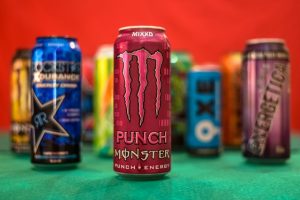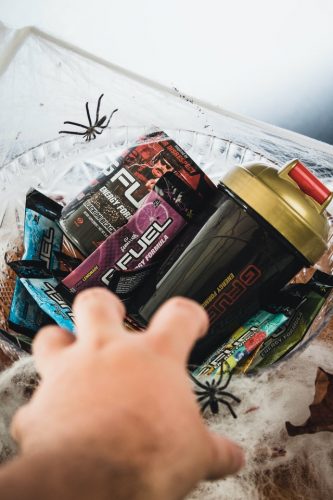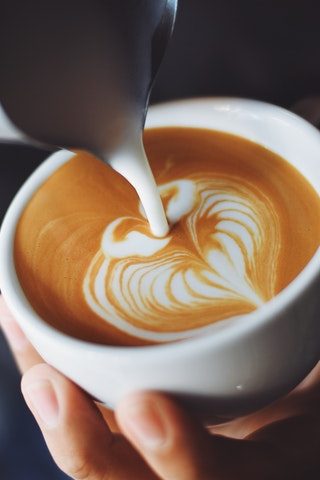
When it comes to caffeine, coffee is king. Or at least it used to be. But some new challengers have stepped up to the plate in recent decades. Of these – the energy drink. Let’s look at coffee vs energy drinks and determine which one gives you the best way to wake up.
The very first energy drink was invented in Japan in 1962, but it would be some years more before it became mainstream, particularly in American culture. Coffee, however, has been around since at least the 15th century. Both of these are now some of the most popular drinks for people who want to consume caffeine.
For a healthy adult, caffeine in moderation is perfectly safe.
When you need a little kick to wake you up in the morning or to pull you out of a mid-day slump, which is better for you, coffee or an energy drink? We’re going to try to answer that question for you based on a few different criteria: caffeine content, sugar, and taste.
Coffee vs Energy Drinks Caffeine Comparison

When speaking of these beverages, the first thing to come to mind is caffeine. It’s the main reason most people choose to drink coffee or energy drinks. So, where do these stack up when it comes to caffeine content?
Ounce per ounce, coffee has more caffeine. However, it’s not that simple of an answer. This is because there are many other factors that play into this, so coffee isn’t necessarily the clear champion. If you choose a very strong energy drink, you will consume twice as much caffeine than from coffee.
First, it all depends on the energy drink (and on the coffee). Coffee has fewer variables than energy drinks so it’s easier to get an average caffeine count on your coffee based on the type of coffee and how it’s brewed.
But energy drinks are all over the place when it comes to their caffeine content, and it really comes down to brand and type of energy drink to help you determine. You also need to look at the comparison of coffee to energy drinks in terms of milligrams of caffeine per ounces of beverage. Otherwise, it’s not going to be an accurate comparison.
Caffeine in Energy Drinks
If we’re going to talk about the caffeine comparisons between these two, we need to take a look at how much caffeine is known to be in certain types of energy drinks.
Here is the amount of caffeine in some popular energy drinks:
- Bang – 300mg in a 16oz serving
- Adrenaline Shoc – 300mg in a 16oz serving
- Redline Max 300 – 300mg in a 2.5oz shot
- 5-Hour Energy Extra Strength – 230mg in a 1.9oz shot
- 5-Hour Energy Regular Strength – 200mg in a 1.9oz. shot
- Starbucks Tripleshot Energy – 225mg in a 15oz. serving
- Full Throttle Energy Drink – 160mg in a 16oz. serving
- Monster Energy – 160mg in a 16oz. serving
- Rockstar Original – 160mg in a 16oz. drink
- Mountain Dew Amp – 142mg in a 16oz. serving
- Red Bull – 80mg in an 8.4oz. serving
And now let’s look at how some coffees compare.
Caffeine in Coffee
It would be nearly impossible to list every single coffee and brand here in one post, but this list has some of the most popular types of coffee to give you an idea. If it’s important for you to know exactly how much caffeine is in your particular type/brand of coffee, you can look it up individually.
Here is the amount of caffeine in some popular coffee types:
- Death Wish Coffee Instant – 300mg in 8oz. serving
- Folgers Classic Roast – 120-160mg in 12oz. serving
- Keurig K-Cup (most varieties) – 75-150mg per 8 oz. serving
- Nespresso Original – 125mg per each capsule
- Folgers ½ Caff – 60-80mg per 12oz. serving
Next, let’s take a look at what it is about caffeine that draws so many people in.
What is Caffeine and Why Do We Love It?
The caffeine in a beverage is one of the big reasons people choose these particular drinks. Whether it’s a habit to get the day started right, or something you use as an afternoon pick-me-up, the main appeal to caffeine is that it perks you up and makes you feel energized.
People also experience the following side effects of caffeine:
- Improved memory
- Improved focus
- Decreased fatigue
- Improved concentration
- Increased reaction time
- Increased metabolism
Many of these side effects/benefits can be short-lived.
Caffeine is one of the only FDA-approved drugs that is present naturally and legally. It’s regularly added to many consumer drinks and foods, yet most people don’t look at it as a drug. Although it is legal and readily available, it still needs to be treated like a drug and used responsibly.
Before we can truly understand how to compare these two, we need to know what’s in them.
What’s in Coffee?

Just what is in that cup of Joe you’re having in the morning? We know it has caffeine because that’s what gives you that wake-up feeling!
But we all know there’s more to coffee than just the caffeine, right? So, let’s take a look at what’s actually in coffee. Basic coffee has just one ingredient: the coffee bean. But we know there’s more to it than that for most coffee drinkers.
When you brew your coffee, you extract the caffeine, the flavors, and even the natural oils from the coffee beans. However, if you brew your coffee with a filter, you won’t have a lot of oil in the cup and that’s actually better for your heart.
A huge benefit to coffee for most people is that plain black coffee has only about 1 calorie per 8oz cup. That said, most people don’t drink plain black coffee. Instead, people add creamers, milk, syrups, and other flavorings and all of these add-ons will make more calories and also change the nutritional value of the coffee.
Coffee can also contain some positive nutrients such as:
- Riboflavin (vitamin B2): 11% of the Reference Daily Intake (RDI).
- Pantothenic acid (vitamin B5): 6% of the RDI.
- Manganese and potassium: 3% of the RDI.
- Magnesium and niacin (vitamin B3): 2% of the RDI.
What’s in Energy Drinks?
And just like coffee, there is more to energy drinks than just the caffeine. The difference is that energy drinks can have a lot of different ingredients and it really varies a lot from brand to brand. Let’s take a look at what is actually in energy drinks.
If you’re concerned about this, your best bet will always be to read the nutrition label of the specific energy drink before you consume it. It’s also important to note that formulas can change, so if you have a favorite energy drink you buy a lot, it pays to check the nutritional labels from time to time to see if anything has been changed.
Here are some ingredients of common energy drinks at the time of this writing:
Red Bull
Red Bull has about 111 milligrams of caffeine and can have up to 37 grams of sugar. This is equal to about three tablespoons of sugar. It also has vitamins B3, B5, B6, B12 and Taurine.
Monster
A can of Monster Energy Drink has 120 mg of caffeine and about 27 grams of sugar. It also has vitamins B2, B3, B6, and B12.
Rockstar
Rockstar is an energy drink shot of 2 ounces. It has a whopping 229 milligrams of caffeine.
5-Hour Energy
5-Hour Energy is another popular energy shot. This one also comes in 2-ounce bottles you can usually find at your local convenience stores. It has 200 mg of caffeine but also has vitamins B6, B12, a Niacin. It has zero calories and zero sugar, but it’s sweetened with Splenda for taste.
Some energy drinks can also have L-Carnitine, Gluconolactone, and Guarana extract, to name a few. There are typically many artificial flavors added to these drinks.
All of these ingredients in energy drinks lead to increased energy levels, but also increased heart rate. They can also lead to heart disease, so it’s important to be careful with them, especially if you already have a known heart condition.
Coffee vs Energy Drinks Sugar Comparison
Besides caffeine, there is another measurement you need to be looking at in your preferred beverage to wake you up.
Sugar.
While it tastes good and helps your energy boost, there are health side effects of consuming sugar so if you’re trying to reduce your sugar intake, it’s important to know how much hidden sugar might be in your beverages.
Black coffee has no sugar in it so if you drink it by itself, the sugar content is zero. When you add sugar, syrups, sweeteners, or creamers, then you will add sugar based on how much sugar those additives have.
On the contrary, energy drinks are loaded with sugar. Some have as much as an average cola, whereas some have even more than that. There are sugar-free energy drinks but the issue with this is that sometimes they use sugar substitutes instead and these are not usually good for you either.
In fact, sometimes artificial sweeteners can be even worse for you than a regular, pure sugar.
Coffee vs Energy Drinks Taste Comparison
And finally, it’s important to consider taste when comparing coffee to energy drinks. Some people simply don’t like the taste of coffee. It’s one of those things where you love it or you don’t (genetics can actually play a role here), and then others can’t stand the taste of energy drinks.
To some people, coffee is too bitter.
To some people, energy drinks taste “medicine-like”.
There’s really no way to say which one tastes better apart from you trying it yourself and seeing which you prefer.
The Coffee and Energy Drink Double Standard
We cannot compare coffee and energy drinks without taking note of the fact that there is a bit of a double standard when we’re talking about the amount of caffeine in energy drinks versus the amount of caffeine in coffee. Energy drinks are often seen in a more negative light.
Typically, coffee is praised for having a higher caffeine content and energy drinks are seemingly demonized for the very same thing. What are the reasons for this?
The biggest reason is that energy drinks have such high contents of caffeine, it makes it easier to abuse. Let’s take a look at why energy drinks can be bad for you.
Are Energy Drinks Bad for You?
This brings up a very important question: Are energy drinks bad for you?
Overall, energy drinks have loads of caffeine and sugar so despite the added vitamins, they’re really not a healthy food. If you decide to drink energy drinks, look for options with the least sugar possible, and also be mindful of how many you drink. Eat a balance diet and be sure to never mix them with drugs and alcohol.
Excessive caffeine consumption can become a medical emergency and when it’s combined with drugs or alcohol, it can quickly become a lethal combo. There are over 20,000 emergency room visits per year from energy drinks and most of these are because people mixed them with alcohol or with drugs.
When choosing to drink energy drinks, you should also take your overall health into consideration.
That said, you might decide to go back to the original “energy” drink: coffee.
Young adults need to be especially cautious around energy drinks and children should not consume them at all. They can contribute to issues like heart troubles or even death, especially if abused or mixed with alcohol.
Five Reasons to Choose Coffee Over Energy Drinks
Here are some great reasons you might choose coffee instead of energy drinks:
- Caffeine content is about the same – As you can see from our comparisons above, the caffeine content is about the same. This means you don’t need to turn to energy drinks to get a bigger caffeine kick, if that’s what you’re in it for.
- Black coffee has no calories – Black coffee has about 1 calorie for 8 ounces of brewed beverage. Of course, that number will go up as you add creamer and flavorings or sugar, but for many people, this is a huge benefit.
- Coffee doesn’t have any weird hidden ingredients – Another benefit to coffee is that it’s much more clear about it’s ingredients. When you brew coffee, you get water and the coffee bean. That’s it. Until you start to add flavorings or sugar, it really is that simple.
- Coffee tastes better – While there are exceptions, most people prefer the taste of coffee to energy drinks. At the end of the day, most people who drink energy drinks are not choosing them for their flavor.
- Coffee has less sugar – In its purest form, coffee has less coffee. If you want to add some sugar or a sugar alternative to your coffee, you have control over how much you add. Energy drinks are loaded with sugar, and you can’t remove it because it’s already prepared when you buy that can.
Even though energy drinks have added B vitamins, at the end of the day, they just aren’t as good for you as coffee. This is why if we have to pick a winner, we choose coffee.
Coffee vs Energy Drinks Conclusions
So, when it comes to coffee vs energy drinks, which one comes out on top? At the end of the day, it’s a personal choice for you.
A plain cup of black coffee is probably the healthiest way to get any caffeine in your daily diet. However, many people don’t drink plain black coffee. So, you need to factor all details into it, including how you prepare your coffee and what you add to it.
We’ve done the research and passed on the information we can find about caffeine content of coffee vs energy drinks, the sugar and other ingredients, and also health facts and ingredients. It is ultimately your choice which you choose to consume and which you think is best.
Whatever you decide, we just want you to drink responsibly. Too much of anything can be a bad thing, so take it easy, eat a balanced diet, exercise regularly, and enjoy your caffeine at safe amounts, however you choose to enjoy it. For another kick butt showdown, check our Tea versus Coffee breakdown here.